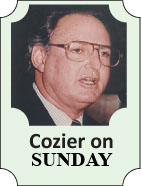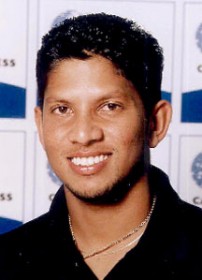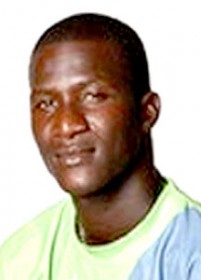The in-word in West Indies cricket at the moment is “tough”.
 Brian Lara used it last week, as in “a very tough job”, while assessing Darren Sammy’s elevation to the captaincy that he himself held, not once, not twice but three times.
Brian Lara used it last week, as in “a very tough job”, while assessing Darren Sammy’s elevation to the captaincy that he himself held, not once, not twice but three times.
Head coach Otis Gibson applied it twice, to cover the team’s forthcoming assignment, as in “Sri Lanka is a tough place to play cricket”, and in explaining the omission of Ramnaresh Sarwan from the chosen 15, as in “it was a tough decision”.
It has also been uttered, at various times, by chief selector Clyde Butts and West Indies Cricket Board (WICB) chief executive Ernest Hilaire among others, in its more positive context, to describe one of the traits that earned Sammy, and the new vice-captain Brendan Nash, their positions.
No new West Indies captain has been greeted with the potential pitfalls that confront Sammy, especially given his previous inability to command a place in the strongest 11.
He appears undaunted, speaking enthusiastically of instilling a new “energy and passion” into his team. He is realistic enough to ask for patience from a public that has all but exhausted it enough to appreciate that, in the circumstances, a little divine intervention would be helpful.
“As a man from a Christian background my mom always told me that the

Almighty never puts His children in positions that He knows that they can’t handle,” he said at his first media conference as captain. “I have given this captaincy over to the hands of the Lord and with Him in charge everything is possible.”
He described it as “a massive honour” but it is also an even more massive challenge, somewhat beyond just tough.
In one way or another, the pressures of the West Indies captaincy have affected all those who have held it.
Richie Richardson was forced to take time off with acute fatigue syndrome and even as confident and celebrated a cricketer as Lara quit after two years of his initial stint “to seek the assistance of appropriate professionals”.
At a time of increasing acrimony between the WICB and the West Indies Players Association (WIPA), Shivnarine Chanderpaul was diminished by tensions within the team that his runs that once flowed in profusion dried up and he gave it up to go back to doing what he did best.
Sammy makes it nine captains since Courtney Walsh took over from Richardson in 1996.
He supplants Chris Gayle, a powerful personality who made plain his desire to continue in the post until next year’s World Cup after which, he told the Jamaica media last week, he would step down.
Gayle remains in the team. In spite of the continuing losses and his detached approach on the field, he developed strong loyalty among his players in his three years at the helm.
Human nature being what it is, there is always the danger that his presence could now impact on team unity. According to Jamaica Cricket Association president Paul Campbell, it was an issue that divided the Jamaica team when Tamar Lambert was made captain over Gayle in the regional T20 tournament in July.
In this case, there are also the potential consequences from the players’

pullout prior to last year’s Bangladesh series that Sammy declined to join.
Seven of those who chose not to play then are among the 15 going to Sri Lanka now.
Gayle is no longer officially in a leadership role but he has graciously wished Sammy well and publicly pledged his support. Such support, strong and visible, is essential for a smooth transition, as was his fellow Jamaican Courtney Walsh’s when he was replaced by Brian Lara in 1997.
In all sport, team spirit can bridge wide gaps between teams – and there are few wider than that between the West Indies at present (placed eighth on the International Cricket Council rankings) and the Sri Lankans (third) on their own patch.
The West Indies have lost all five Tests on their two previous trips there. If they had to make do with a team decimated by the first players’ strike in 2005, they were even more heavily thrashed in three Tests when at full strength four years earlier, in spite of Lara’s phenomenal 688 runs in his six innings.
In their 16 Tests at home since 2005, Sri Lanka’s win-loss split is 16-3. The strong South Africans have been beaten in three of their four. India, the current No.1, shared the series in July 1-1. Their island is a virtual cricketing fortress.
Unfortunately – and, in one case, unnecessarily – the West Indies won’t have all their best players available all the time.
Sulieman Benn, whose ever improving left-arm spin has given the attack telling balance over the past two years, is debarred from the first Test, a legacy of another breach of the ICC’s code of conduct by the tall Bajan during the Kensington Oval Test against South Africa in June.
Sarwan, the established No.3 for most of the 10 years he has been in the team and with an average of 57.16 in seven Tests against Sri Lanka, is left out, presumably for the lack of fitness that earlier caused him to lose his retainer contract.
The WICB offered a graphically uncompromising explanation for its original decision.
It charged that, in spite of warnings, Sarwan had an “extremely indifferent attitude and sporadic approach towards fitness, particularly in recent years”.
This led to “less than satisfactory and fluctuating fitness levels”.
As evidence, it noted that injuries had restricted him to less than half the West Indies international matches in the preceding contract period (two Tests and 13 ODIs/T20s).
It was clearly part of its stated new, tough line in what it described in its published selection criteria as “the ongoing development of a new team ethos”.
In light of the slackness that had come to permeate teams at all levels, it was to be welcomed.
That statement was issued on September 15. The team for Sri Lanka was picked two months later.
In the interim, Sarwan played in Guyana’s every match in the regional T20 tournament, the Champions League in South Africa and the WICB’s 50-overs tournament without so much as a headache (save those brought on trying to make something of an ordinary team).
It was not enough for the selectors who appear to have been guided only by the fitness reports on Sarwan a couple of months earlier.
“Persons with injury problems need to address that,” Coach Gibson said. “We took the decision to address them at the selection of the team, rather than waiting until we reach on tour.”
On that score, the recent and recurring injury problems of some of those picked for Sri Lanka should also have been addressed at the selection.
The WICB’s new emphasis on fitness and commitment is overdue but it needs to be fair and balanced. In Sarwan’s case, it is neither.





